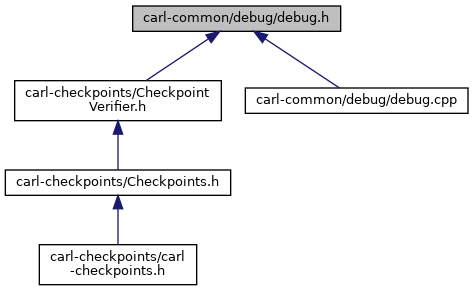#include <csignal>#include <forward_list>#include <iostream>#include <list>#include <map>#include <set>#include <sstream>#include <typeinfo>#include <unordered_map>#include <vector>#include "../meta/platform.h"#include <unistd.h>

Go to the source code of this file.
Namespaces | |
| carl | |
| carl is the main namespace for the library. | |
Macros | |
| #define | REGISTER_ASSERT |
| Registers an upcoming assertion with the SIGABRT signal handler. More... | |
| #define | UNREGISTER_ASSERT |
| #define | REGISTERED_ASSERT(condition) REGISTER_ASSERT; assert(condition); UNREGISTER_ASSERT |
Functions | |
| void | carl::printStacktrace () |
| Uses GDB to print a stack trace. More... | |
| std::string | carl::demangle (const char *name) |
| std::string | carl::callingFunction () |
| template<typename T > | |
| std::string | carl::typeString () |
Detailed Description
Definition in file debug.h.
Macro Definition Documentation
◆ REGISTER_ASSERT
| #define REGISTER_ASSERT |
Registers an upcoming assertion with the SIGABRT signal handler.
If the program is compiled in debug mode, a signal handler is installed automatically that catches SIGABRT that is send when an assertion fails. The signal handler uses the data in last_assertion_string and last_assertion_code to generate an additional message and a custom exit code whenever an assertion is thrown. As for last_assertion_code the line number of the usage of this macro is used.
If REGISTER_ASSERT was not called before SIGABRT is catched, the exit code is 23.
This macro is intended to be used to identify a single assertion from the exit code in automated testing, for example using the delta debugger. The usage will usually look like this:
◆ REGISTERED_ASSERT
| #define REGISTERED_ASSERT | ( | condition | ) | REGISTER_ASSERT; assert(condition); UNREGISTER_ASSERT |
◆ UNREGISTER_ASSERT
| #define UNREGISTER_ASSERT |